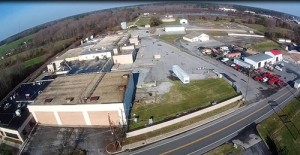
BERLIN — Berlin’s mayor outlined his vast vision this week for a 65-acre parcel, known as the Tyson property, including it being an environmental, transit, recreational and educational hub for the area.
Mayor Gee Williams addressed a number of town matters in a sweeping interview this week but his passion reached its apex when he was asked about the future of the former poultry processing plant property, located on Old Ocean City Boulevard between Routes 113 and 50 and Main Street.
According to Williams, the property acquisition should become official in February. The town previously conducted an appraisal and environmental studies. The town council voted 4-0 last month to issue and sell general obligation bonds in the amount of $3 million — $2.5 million to buy the land from owner Berlin Properties North and $500,000 for work on the site.
At last month’s meeting, Williams said the town’s consulting firm would soon be presenting the town with its report on the potential uses for the property. Whatever they may be, Williams said last month the property’s future “will be a mix” and “self-sustaining financially.”
This week the mayor expanded on what he sees the property being used for in the future, specifically the half of the property that contains water.
“The ponds offer an unbelievably perfect setting for all kinds of recreation and environmental opportunities, from walking trails to biking to having students come out and do environmental projects. It’s a gem and to me it’s our duty and obligation to preserve that but also it doesn’t do any good if it’s hidden from the world,” said Williams. “You have to see and touch the natural environment if you are going to have any appreciation for it. That’s what we want to do with that part of the property. It will happen and it will be a rewarding experience while environmentally responsible.”
Williams said officials have begun referring to the property as “Berlin Falls,” which hints at how Williams sees the town addressing one of its unique shortcomings.
“We are now calling it — for the purposes of the label — the ‘Berlin Falls.’ Why are we calling it that? Because the initial feasibility study outlined about seven different concepts … one of those options offered creating a permanent, beautiful waterfall between those ponds,” Williams said. “Do you realize the only time we have water in this town that’s not in pipes is when we have a very hard rain? We’re the only community in this region that does not have a natural water asset. We can have something unique to the entire Delmarva peninsula.”
Williams said he imagines the waterfall being a heavily photographed part of town and often being used for backdrops for weddings, senior portraits and other special events.
Along with redevelopment of the buildings on the property, Williams also sees the new property as a potential hub of what he calls “locally grown transit.”
“We want to become a model for a multi-modal small community, where you have an app or a phone number to track transportation opportunities,” he said. “Small trolleys, small buses, larger golf carts … this property is so close to the downtown that it has such potential. There’s also bike sharing and that doesn’t cost millions of dollars or anything like that. We will partner with any good partner from the private, non-profit, faith-based and education sector so long as everyone is doing what they do best. Maybe multiple horse and carriage rides.”
Williams predicts work on the site getting underway soon after it’s officially acquired. Williams also addressed in the interview the property’s future if the county becomes home to an excursion train operation.
“I would see this as at a minimum at least a substation for that, if not the main station. There will be hundreds of parking spaces available where people could walk a short distance to the boarding station and then be close to the downtown,” he said.
Williams believes growth is important for Berlin because he knows what it’s like to not embrace progress.
“This is one of the paradoxes. To preserve the quality of life to everyone here as well as future generations we need to grow. We can’t just say we’re not growing anymore and we want everything to stay the same. We tried that in my lifetime, saying we can get by with no growth whatsoever. The community almost died. I’m afraid some people in our community don’t realize that,” he said. “If we plan for incremental growth and I hope a little better than that, we can make all this happen in a very responsible way. None of this is going to take a miracle, but it will take working together and sharing a vision. I see as my major responsibility as mayor … to share this vision with the people of this town. By that, I mean you can be a citizen of Berlin in three ways — you can live here, work here and be a guest here. Either way you are a citizen of Berlin and you are vital to our future.”

